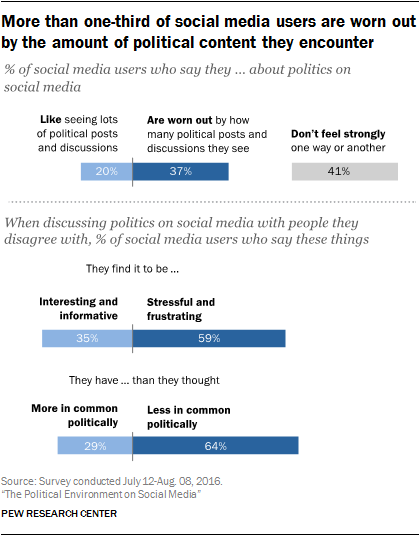 In a political environment defined by widespread polarization and partisan animosity, even simple conversations can go awry when the subject turns to politics. In their in-person interactions, Americans can (and often do) attempt to steer clear of those with whom they strongly disagree.
In a political environment defined by widespread polarization and partisan animosity, even simple conversations can go awry when the subject turns to politics. In their in-person interactions, Americans can (and often do) attempt to steer clear of those with whom they strongly disagree.
For several election cycles, Pew Research Center has documented the extent to which Americans are turning to social media for political information and action. The current political environment – featuring exceptionally high levels of interest in the election, partisan antipathy and political polarization – makes for an especially complex atmosphere for today’s social media users. The typical social media user inhabits a digital world that contains a wide mix of connections, ranging from close friends and family members to public figures or distant acquaintances. Often these friend networks represent a potentially combustible mixture of conflicting political opinions, and this intermingling of the personal and the political can lead to frustration and annoyance for users as they attempt to make their way through these digital spaces.
As political discussions move into otherwise personal social media spaces, users are confronted with a range of social challenges, such as navigating posts from friends and family members that they vehemently disagree with or find offensive. This survey highlights the contradictions and tradeoffs (as well as benefits) of social media interactions in an era of widespread political polarization and partisan antipathy. For many social media users, this influx of political content is a source of frustration and annoyance. A substantial share of social media users are worn out by the tone and volume of political material they encounter on these platforms and view social media as an inherently angry and disrespectful medium in comparison to other venues for discussing politics.
For those who are heavily interested in politics, social media offers an especially compelling environment for engaging with news, information and discussion about political issues. But although social media can help facilitate connections to the causes people care about, it can also expose these same users to negative or aggressive speech and require them to more attentively curate their social feeds.
While a relatively small share of Americans engage in technology-mediated “gig work,” a substantially larger share has utilized these services as consumers. And in addition to asking about workers’ experiences using online platforms to perform tasks or services for others, Pew Research Center asked a series of questions of the broader public in order to gauge their views about these new modes of work (note: these findings were taken from a separate survey conducted in late 2015, see the Methodology section of this report for more details). Overall, their attitudes reflect a mixture of positive and negative views, along with a healthy dose of uncertainty about the relative merits of gig work.
Digital work platforms allow users to earn money from their labor – in other words, their time or skills. But other platforms allow them to earn money from their capital (in other words, things that they own or possess). This survey examined two types of these capital platforms: home-sharing sites, where people can rent out all or part of their homes for a short period of time, and online selling platforms, where users can sell items ranging from used goods to their own personal handicrafts.
On Tuesday, Americans handed the U.S. presidency to a racist, xenophobic, authoritarian, climate science-denying, misogynistic, revenge-obsessed ego-maniac — and with it control over a vast and all-too-unaccountable intelligence apparatus; and in a speech less than three weeks ago, Trump promised to sue all of the women who have come forward with sexual assault accusations against him.
 Each year, The Internet Foundation In Sweden (IIS) produces a report titled ‘Swedes and the Internet.’ As its name suggests, the report aims to shine light on how people behave online.
Each year, The Internet Foundation In Sweden (IIS) produces a report titled ‘Swedes and the Internet.’ As its name suggests, the report aims to shine light on how people behave online.
Covering issues from social media to smartphones, gambling, and of course, content consumption and file-sharing, the survey of 3,000 citizens aged 11-years-old and up has provided interesting insights in previous years. 2016 is no different.
In the Trump Era, Leaking and Whistleblowing Are More Urgent, and More Noble, Than Ever
For the past 15 years, the U.S. government under both parties has invented whole new methods for hiding what it does behind an increasingly impenetrable wall of secrecy. From radical new legal doctrines designed to shield its behavior from judicial review to prosecuting sources at record rates, more and more government action has been deliberately hidden from the public.

From Safety Check to crisis-detection algorithms and internet drones, the social media behemoth is becoming a vital tool in catastrophic situations.

The map provides a fascinating glimpse at America’s electoral process in action.

How could we be so wrong? In the months leading up to the election, like many others, I was convinced that Hillary Clinton was on a smooth course to victory. Trump, I rationalized, was too divisive. Too extreme. Too much of a political outsider. Every day, I would religiously turn to Nate Silver’s FiveThirtyEight for comforting statistics about how Clinton was besting Trump in the polls. It seemed like a sure thing. And then last night happened.

Inside Team Trump, some saw this coming.

Here are the steps between voters casting their ballots and a country hearing their results.

Over the past 19 months, we’ve seen what can happen when technology is misused. T
This article is part of the “Who Controls the Internet?” installment ofFuturography, a series in which Future Tense introduces readers to the technologies that will define tomorrow. Future Tense is a collaboration among Arizona State University, New America, and Slate. On Thursday, Nov. 10, Future Tense will hold an event in Washington, D.C., titled “Will the Internet Always Be American?” For more information and to RSVP, visit the New America website.

Donald Trump is going to be the 45th President of the United States. For better or for worse, this is a reality that we now have to live with. Amidst the anger and fear, people are looking for someone to blame.

Disruption. There’s a reason startups use this buzzword – they’re all about trying new things, testing them, and doing it all over again. As fast-moving startups continue to topple incumbent companies, more traditional organizations must figure out how to stay relevant.
 Copyright is a double-edged sword. Those who sharpen one side often get cut by the other, with all the painful consequences that come with it.
Copyright is a double-edged sword. Those who sharpen one side often get cut by the other, with all the painful consequences that come with it.
That’s exactly what’s happening to the Business Software Alliance (BSA) this week.

Snapchat may be most folks’ ephemeral messaging app of choice, but it’s by no means the only one, or even the best.
It’s common knowledge that Facebook is the dominant social network in terms of user base, but a new report from Pew Research Center showed just how dominant it is.
Discover more from Erkan's Field Diary
Subscribe to get the latest posts sent to your email.